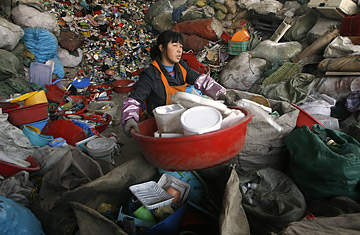
A woman carries assorted plastic products she collected from a garbage pile at a recycling center in central Beijing
In Beijing, the dividends from recycling are instant: hard cash for discarded cardboard, paper and plastic bottles, paid by the junk men who trawl the streets on tricycles each morning, yelling "Collecting scrap! Collecting scrap!" So fierce is the demand that a bag of trash rarely makes it to the curb before someone is poking through it in search of recyclables.
The destination of much of Beijing's recyclable scrap is Dongxiaokou village, on the capital's northern outskirts, where 700 families work on sorting and preparing it for a second life. The yards of Dongxiaokou are filled with stacks of old radiators, piles of cardboard, old tires and inner tubes, mounds of glass smashed into tiny shards, nests of tangled rebar and cooking-oil jugs looped together with string. A mountain of plastic bottles more than two stories tall looms over the squat brick buildings where recyclers live and work. "Somewhere in there is a bottle you used," says a woman as she sits at the edge of the pile, rapidly grabbing bottle after bottle, stripping their labels and tossing the shorn containers into a basket.
Just as China's economic boom fueled a roaring demand for the raw materials of much of Asia and Africa, so has it spurred an insatiable appetite for recyclable scrap paper, plastic and metals. In recent years, amazing stories have emerged around the world about stolen manhole covers, junk haulers making healthy salaries, and coins being melted down because their value as scrap, with China the big buyer, exceeded their face value. China's scrap trade has lifted the fortunes of both the very wealthy — such as Nine Dragons Paper CEO Zhang Yin, whose recycled-paper manufacturing company made her China's richest person in 2006 — and very poor farmers who have migrated to the city to earn more from recycling than they ever could by working the land. (See pictures of the global financial crisis.)
While Dongxiaokou's scrap yards have epitomized China's industrial boom over the past two decades, the global economic slowdown has left the scrappers struggling as prices for raw materials plummet. A group of men from Henan sit at a table playing a card game called "Fight the Landlord." They're the owners of a huge mound of plastic bottles they could process, but if they sold them now, they would lose money — scrap prices have fallen to levels not seen in years. "You want to know why our prices are dropping?" says Zhang Zhongming, 43, who moved to the village 20 years ago from Henan. "It's because of the U.S. economic crisis. It's affecting the whole world. We're facing 50% losses."
Slowing consumer demand in America and Europe has cut output at Chinese factories — although China's exports grew at an annual rate of 19% in October, some economists believe that could fall below 10% by the end of the year because of lower Christmas-season orders for products like electronics. And China's notoriously thrifty consumers haven't made up for the drop in foreign demand. Amid the global turmoil, their expectations for rising incomes are at the lowest level recorded in years. All of that threatens to turn Dongxiaokou from the epicenter of a bustling recycling economy into a massive junkyard.
"It's like a pair of shoes," says Wang Zhangen as he stands next to a pile of glass destined for a factory in Handan, 260 miles away. "If you're feeling wealthy, you can buy a new pair of shoes. If you're not, you wear the same ones. Nobody is buying cars or houses, so no one needs glass."
Zhang Wei, 42, came here in 1990 from Henan, where his family of six was struggling to live by farming one-third of an acre. "In the past, nobody would do this work," he says. "It's for the outsiders, poor people from the countryside where they can't earn enough to eat meat even." Now the specter of deprivation is emerging again. Plastic bottles, which sold for $1,175 to $1,300 a ton as recently as the summer, are now trading in the $300-to-$450-a-ton range. Zhang claims that as a result of the downturn in scrap prices, the losses sustained by some of his neighbors have ranged from $6,000 to $150,000.
Nearby, a man repairs a machine that shreds plastic bottles into nickel-size shards. Like most residents of the village, he migrated here from the countryside in the early '90s. "We came to work, because it's better than Henan," he says. Now he isn't so sure, but he knows that things won't be any better if he returns. The machine, now fixed, roars to life. "What to do?" he wonders with a shrug as he begins feeding old bottles into the machine. Back to work, that's his answer. The scrappers of Dongxiaokou can only hope the global economy follows suit.
